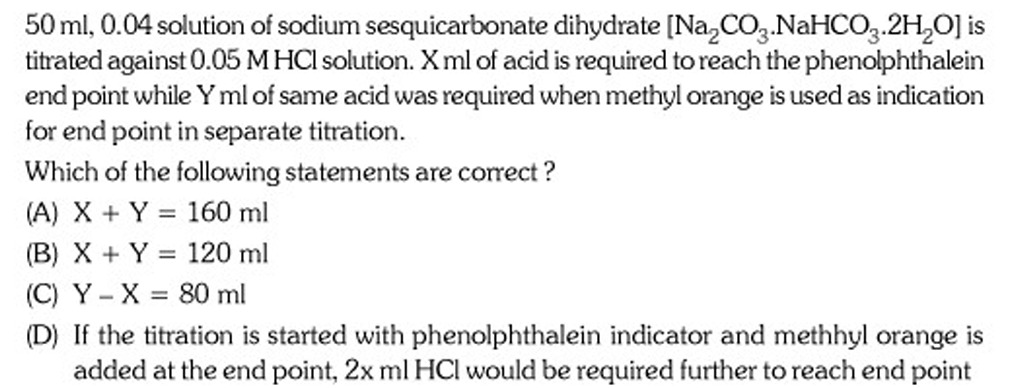Question
Question: 50 ml, 0.04 solution of sodium sesquicarbonate dihydrate $[Na_2CO_3.NaHCO_3.2H_2O]$ is titrated agai...
50 ml, 0.04 solution of sodium sesquicarbonate dihydrate [Na2CO3.NaHCO3.2H2O] is titrated against 0.05 M HCl solution. X ml of acid is required to reach the phenolphthalein end point while Y ml of same acid was required when methyl orange is used as indication for end point in separate titration.
Which of the following statements are correct?

X + Y = 160 ml
X + Y = 120 ml
Y-X = 80 ml
If the titration is started with phenolphthalein indicator and methhyl orange is added at the end point, 2x ml HCl would be required further to reach end point
Options (A), (C), and (D) are correct.
Solution
Solution:
Given salt: Na2CO3⋅NaHCO3⋅2H2O
-
Contains 1 mole of CO32− and 1 mole of HCO3− per mole of salt.
-
Reaction steps:
- With phenolphthalein: Only CO32− is neutralized CO32−+H+→HCO3− (1 eq acid per salt molecule)
- With methyl orange: Complete neutralization of both HCO3− groups HCO3−+H+→H2CO3 (2 eq acid per salt molecule)
Thus, total acid needed per mole salt = 1 + 2 = 3 eq.
For a 50 mL, 0.04 M salt solution:
Moles salt = 0.05 L × 0.04 M = 0.002 moles
Acid needed for phenolphthalein endpoint (X) = 0.002 moles HCl
Acid needed for complete neutralization (Y) = 3 × 0.002 = 0.006 moles HCl
Using 0.05 M HCl:
X=0.05 mol/L0.002 mol=40 mL
Y=0.05 mol/L0.006 mol=120 mL
Now check the statements:
(A) X + Y = 40 + 120 = 160 mL → Correct
(B) X + Y = 120 mL → Incorrect
(C) Y – X = 120 – 40 = 80 mL → Correct
(D) If titration starts with phenolphthalein (endpoint at 40 mL), then adding methyl orange gives further acid needed = Y – X = 80 mL, which equals 2X (since 2×40 = 80) → Correct
Summary (Minimal Explanation):
- Mole salt = 0.002 mol
- Phenolphthalein endpoint: 0.002 mol HCl → 40 mL
- Methyl orange endpoint: 0.006 mol HCl → 120 mL
- Hence, X + Y = 160 mL, Y – X = 80 mL and additional acid required after phenolphthalein endpoint = 80 mL = 2×40 mL.
